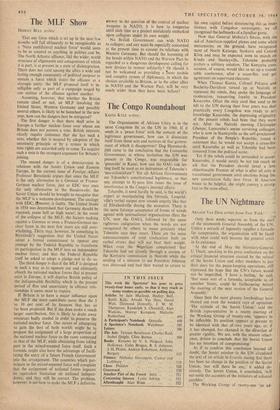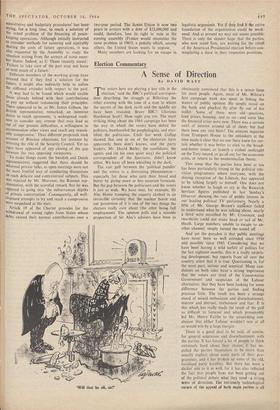The UN Nightmare , 1.1 ARNOLD VAS DIAS writes front New
York: Only three weeks separate us from the start of the nineteenth General Assembly of the UN. Unless a miracle of ingenuity supplies a formula for compromise, the organisation will be faced with what could well become the greatest crisis in its gxistence.
At the end of May the Secretary-General, U Thant, speaking in his press conference on the critical financial situation created by the refusal of the Soviet Union and other members to pay their dues for the peace-keeping operations, still expressed the hope that the UN's future would not be imperilled. 'I have a feeling,' he said, 'that some sort of a formula, acceptable to all member States, could be forthcoming before the meeting of the next session of the General Assembly.'
Since then the most gloomy forebodings have blotted out even the weakest rays of optimism. The attitude of the Soviet Union,' said the British representative in a recent meeting of the Working Group of twenty-one, 'appears to be inflexible. Its position appears at present to be identical with that of .two years ago, or, if it has changed, has changed in the direction of greater rigidity. We are, with the utmost reluct- ance, driven to conclude that the Soviet Union has no intention of compromising.'
As if to confirm this conclusion beyond all doubt, the Soviet mission to the UN circulated the text of an article in /zpestia stating that there has been no change in the position of the Soviet Union; 'nor will there be any,' it added de- cisively. The Soviet Union, it concluded, 'will not settle the accounts of the initiators of colonial gambles.'
The Working Group of twenty-one 'on ad- ministrative and budgetary procedures' has been trying, for a long time, to reach a solution of the vexed problem of the financing of peace- keeping operations. Although initially instructed to consider methods for covering and equitably Sharing the costs of future operations, it was also requested by the Assembly to study the situation arising from the arrears of some mem- ber States. Indeed, as U Thant recently stated: 'Failure to take care of the past may not leave US with much of a future.'
Different members of the working group have stressed that if they find a solution for the future, it might also indirectly help to soften the stiffened attitudes with respect to the past. A way had to be found which would enable those already behind with their contributions to pay up without renouncing their principles. There appeared to be, as Mr. James Gibson, the British representative, remarked, an intensive desire to reach agreement, 'a widespread readi- ness to consider any avenue that may lead us out of our present difficulties, a willingness to accommodate other views and reach any reason- able compromise.' Thus different proposals took account of Russian objections, for instance by stressing the role of the Security Council. Yet no Signs have appeared of any closing of the gap between the two opposing viewpoints.
To make things easier the Swedish and Dutch representatives suggested that there should be informal private talks, as open meetings were not the most fruitful way of conducting discussions on such delicate and controversial subjects. This was rejected by Mr. Morosov, the Russian rep-
resentative, with the scornful remark that he was oPposed to- going into 'the subterranean depths
of private conversation.' Consequently, all well- disposed attempts to try and reach a compromise Were torpedoed at the start.
Article 19 of the Charter provides for the Withdrawal of voting rights from States whose debts exceed their normal contributions over a two-year period. The Soviet Union is now two years in arrears with a debt of $52,600,000 and could, therefore, lose its right to vote at the coming assembly (France would encounter the same problem in 1965), a penalty which, among others, the United States wants to impose.
Many members are looking for an escape in legalistic arguments. Yet if they find it the entire foundation of the organisation could be weak- ened. And at present no way out seems possible. There is only the slender hope that the parties, who now stand firm, are waiting for the result of the American Presidential election before con- templating a thaw in their respective positions.



































 Previous page
Previous page